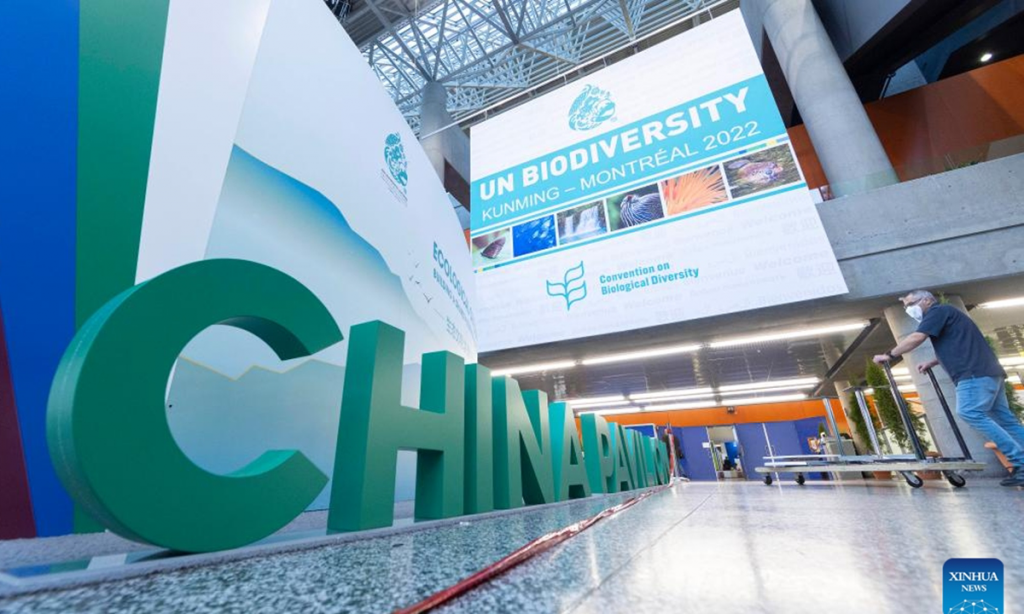Published: December 18,2022
By Leng Shumei and Shan Jie

A worker pushes a cart past the China Pavilion of the second part of the 15th meeting of the Conference of the Parties (COP15) to the UN Convention on Biological Diversity (CBD) in Montreal, Canada, on Dec. 6, 2022. The second part of the 15th meeting of the Conference of the Parties (COP15) is scheduled for Dec. 7-19 in Montreal. Photo: Xinhua
Meeting focuses on finalizing frame for next decade, bridging funding gap
Chinese President Xi Jinping on Thursday addressed the opening ceremony of the high-level segment of the second phase of the 15th meeting of the Conference of the Parties (COP15) to the UN Convention on Biological Diversity (CBD) via videolink, as nearly 200 minister-level officials from more than 150 contracting parties gather in Montreal, Canada at the China-hosted meeting to discuss a solution for the conservation of nature in the next decade and beyond.
Humanity lives in a community with a shared future. Be it in overcoming the COVID-19 pandemic, or in enhancing biodiversity protection and achieving sustainable development globally, solidarity and cooperation is the only effective way to address global challenges, Xi said.
In his speech, Xi called for building global consensus on biodiversity protection, jointly working for the conclusion of the Post-2020 Global Biodiversity Framework (GBF), and identifying targets and pathways for global biodiversity protection.
“We need to push forward the global process of biodiversity protection, turn ambitions into action, support developing countries in capacity-building, and coordinate efforts to address climate change, biodiversity loss and other global challenges,” Xi said.
In a bid to reverse biodiversity loss, negotiations at the second phase of COP15 are centered on finalizing the landmark Post-2020 GBF to clarify new global biodiversity protection goals, and promote the transformation and reform of global biodiversity governance, Cui Shuhong, director of the Department of Nature and Ecology Conservation at the Ministry of Ecology and Environment, said at the ministry’s press conference in late November.
The GBF is needed as none of the 20 Aichi Targets agreed by the parties to the CBD in 2010 in Japan was fully met by the 2020 deadline. Therefore, at the UN biodiversity conference in 2018, all parties agreed on developing new targets under a Post-2020 GBF to replace the Aichi Targets, analysts said.
Serious underfunding is one of the main reasons why the Aichi Targets have not been met. This means that all parties are paying close attention to COP15, and are expecting it to reach consensus on ambitious protection goals as well as matching resources to achieve these goals, Zhao Yingmin, representative of the presidency of COP15 and vice minister of China’s Ministry of Ecology and Environment, said at a parallel session on the financing industry and biodiversity of COP15 on Wednesday.
According to estimates by the CBD resource mobilization expert group on the funding requirements for the completion of the first draft of the GBF, the world needs to invest $150-300 billion per year, which is far beyond the current global yearly biodiversity funding of $78-91 billion. Whether we can reach a consensus on funding issues and mobilize performance funds that are commensurate with the goals of the GBF expected by all parties will be the key to determining whether the framework can be successfully achieved and implemented, Zhao noted.
Some Western media reported Thursday that some representatives from developing countries walked out of discussions, as contracting parties could not reach consensus on whether developed or developing countries should pay to protect Earth’s ecosystems.
Oscar Soria, campaign director of the activism organisation Avaaz, who is in Montreal for the talks, told the Guardian that the walkout showed that developing countries are tired of the behavior of rich nations on biodiversity finance.
“Without money, this will turn into a weak deal, and Montreal will be the next Copenhagen. Developing countries left the meeting because they considered that it was impossible to make progress in the discussions as developed countries were not ready to compromise, and they invited the parties that are obstacles to the discussions to reflect on their positions in order to move forward to another point,” he said.
The international public funds provided by developed countries are incomparably important and dominant for developing countries to implement the GBF. At the same time, in order to bridge the global biodiversity funding gap, resources need to be mobilized from all sources to support the implementation of the CBD and the GBF, Zhao noted.
Zhao stressed that financial institutions, as important stakeholders that promote the allocation of social resources, also play a unique role in biodiversity conservation. They avoid potential biodiversity damage through investment risk management, and promote financial resources to the field of biodiversity conservation via investment and innovation.
Although there are still many difficulties and demands, all parties have expressed their firm political support and confidence in the negotiation process and in China’s role as COP15 president, Huang Runqiu, China’s Minister of Ecology and Environment and COP15 president, said at a press conference earlier this month. He said that China has exercised leadership and coordination in its efforts to advance negotiations for the framework.
“Developed countries should fulfill the obligations stipulated in the CBD and related protocols and provide more support for developing countries with regard to funding, technology and capacity-building to make up for the gap in biodiversity governance capability among nations,” Huang said.
“In terms of funds, technology, and talent, as one of the countries with the richest biodiversity in the world, China has conscientiously implemented the Aichi Biodiversity Targets, clarified various tasks and responsibilities, and achieved positive results in the implementations,” Cui said at the press conference in November.
globaltimes.cn
 Africa -China Review Africa -China Cooperation and Transformation
Africa -China Review Africa -China Cooperation and Transformation
